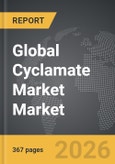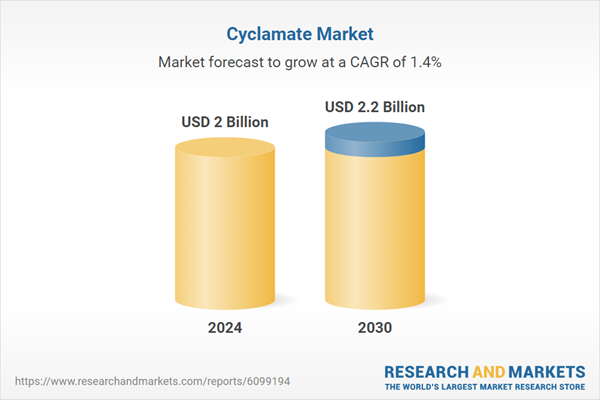Global Cyclamate Market - Key Trends & Drivers Summarized
Why Is Cyclamate Re-Emerging as a Cost-Effective Artificial Sweetener Across Global Food Markets?
Cyclamate, a non-nutritive artificial sweetener derived from cyclohexylsulfamic acid, is gaining renewed interest in the global food and beverage industry due to its cost-efficiency, high sweetness intensity, and synergistic performance when blended with other sweeteners. Approximately 30 to 50 times sweeter than sucrose, cyclamate is used in sugar-free and low-calorie formulations across beverages, confectionery, dairy products, tabletop sweeteners, and pharmaceuticals. Its ability to mask bitter aftertastes and enhance flavor profiles makes it particularly valuable in multi-sweetener systems with aspartame, saccharin, or acesulfame-K.As global health concerns over obesity, diabetes, and caloric intake intensify, manufacturers are reformulating products to reduce sugar content without compromising taste or texture. Cyclamate's heat stability, long shelf life, and affordability make it a preferred option in markets with cost-sensitive consumers and regulatory allowances. Although banned in the United States since 1970 due to early toxicology concerns, cyclamate remains approved and widely used across over 100 countries, including China, Brazil, Indonesia, and the European Union under strict usage limits.
What Formulation Advances and Regulatory Trends Are Shaping the Global Cyclamate Industry?
Advances in food science and toxicological assessment are reshaping perceptions and applications of cyclamate. Re-evaluation by several international regulatory bodies, including JECFA and EFSA, has affirmed the safety of cyclamate when consumed within established Acceptable Daily Intake (ADI) levels - typically around 7 mg/kg body weight. Modern manufacturing processes are also improving purity profiles and minimizing impurity residues such as cyclohexylamine, which was previously a point of toxicological concern.Cyclamate is now being incorporated into more complex sweetener blends that optimize sweetness onset, mouthfeel, and lingering perception in zero-calorie products. Its synergistic effect with high-intensity sweeteners like sucralose and stevia allows for significant cost reductions while maintaining flavor fidelity. In carbonated beverages, instant drink powders, yogurts, and bakery mixes, cyclamate provides consistent sweetness across a range of pH and thermal conditions.
Regulatory harmonization and regional approvals are playing a pivotal role in market expansion. For example, the European Union permits sodium and calcium cyclamates under E952 designation, with defined maximum use limits per product category. Brazil, one of the largest users of cyclamate, mandates clear labeling and concentration thresholds to ensure consumer safety. As nations update food additive codes and sugar reduction targets, cyclamate's role as an economical and functional sweetener is gaining institutional support in regulatory roadmaps.
Who Are the Key End-Users and How Are Market Dynamics Shifting Across Regions and Segments?
The major end-users of cyclamate include beverage manufacturers, low-calorie sweetener brands, pharmaceutical companies, and foodservice operators. Soft drinks remain the dominant application segment, particularly in markets like Indonesia, the Philippines, and Egypt, where cyclamate is used extensively in carbonated beverages and instant juice powders. In tabletop sweetener blends, cyclamate is often combined with saccharin to balance taste and achieve long-lasting sweetness.In the pharmaceutical sector, cyclamate is used in the flavoring of oral syrups, lozenges, chewables, and OTC products for children and diabetics. Bakery and dairy product manufacturers in Eastern Europe and Latin America use cyclamate in fillings, creams, and sugar-reduced formulations to appeal to diet-conscious consumers. Retailer demand for private-label sugar substitutes has also contributed to increased bulk cyclamate usage, especially in Middle Eastern and North African markets.
Asia-Pacific dominates global cyclamate production and consumption, led by China and Indonesia, both of which have well-established manufacturing bases and broad regulatory acceptance. Latin America, particularly Brazil and Argentina, represents a high-volume, application-diverse market. In Europe, selective usage and consumer transparency are helping cyclamate maintain its presence in reduced-calorie food sectors. In contrast, the U.S. market remains inaccessible due to FDA restrictions, although recent industry petitions for re-evaluation have sparked renewed debate.
What Is Driving the Resurgence and Resilience of the Cyclamate Market Worldwide?
The growth in the cyclamate market is driven by global demand for low-cost sugar substitutes that offer high sweetness potency, shelf stability, and formulation flexibility. As governments implement sugar taxes, reformulation mandates, and front-of-pack nutritional labeling schemes, food and beverage companies are under pressure to reduce sugar content without compromising on consumer taste expectations - creating fertile ground for cyclamate adoption.Cost competitiveness is a key differentiator, with cyclamate often priced significantly lower than newer sweeteners like stevia or monk fruit. Its ability to work synergistically in multi-sweetener systems enables manufacturers to optimize taste profiles while minimizing formulation costs. In regions with limited regulatory restrictions, cyclamate serves as a critical enabler for widespread access to affordable, sugar-reduced products.
Ongoing toxicological reviews, combined with modern analytical safety evaluations, are gradually improving cyclamate's regulatory outlook. As public health priorities evolve, and as emerging markets continue to expand their processed food sectors, cyclamate is poised to maintain its relevance as a versatile, scalable, and economically viable ingredient in the global sweetener landscape.
Report Scope
The report analyzes the Cyclamate market, presented in terms of market value (US$). The analysis covers the key segments and geographic regions outlined below:- Segments: Type (Cyclamic Acid, Sodium Cyclamate, Calcium Cyclamate); Form (Crystal, Powder); Application (Food & Beverages, Pharmaceutical, Cosmetics, Other Applications).
- Geographic Regions/Countries: World; United States; Canada; Japan; China; Europe (France; Germany; Italy; United Kingdom; Spain; Russia; and Rest of Europe); Asia-Pacific (Australia; India; South Korea; and Rest of Asia-Pacific); Latin America (Argentina; Brazil; Mexico; and Rest of Latin America); Middle East (Iran; Israel; Saudi Arabia; United Arab Emirates; and Rest of Middle East); and Africa.
Key Insights:
- Market Growth: Understand the significant growth trajectory of the Cyclamic Acid segment, which is expected to reach US$1.2 Billion by 2030 with a CAGR of a 1.6%. The Sodium Cyclamate segment is also set to grow at 1% CAGR over the analysis period.
- Regional Analysis: Gain insights into the U.S. market, valued at $548.1 Million in 2024, and China, forecasted to grow at an impressive 2.8% CAGR to reach $399.7 Million by 2030. Discover growth trends in other key regions, including Japan, Canada, Germany, and the Asia-Pacific.
Why You Should Buy This Report:
- Detailed Market Analysis: Access a thorough analysis of the Global Cyclamate Market, covering all major geographic regions and market segments.
- Competitive Insights: Get an overview of the competitive landscape, including the market presence of major players across different geographies.
- Future Trends and Drivers: Understand the key trends and drivers shaping the future of the Global Cyclamate Market.
- Actionable Insights: Benefit from actionable insights that can help you identify new revenue opportunities and make strategic business decisions.
Key Questions Answered:
- How is the Global Cyclamate Market expected to evolve by 2030?
- What are the main drivers and restraints affecting the market?
- Which market segments will grow the most over the forecast period?
- How will market shares for different regions and segments change by 2030?
- Who are the leading players in the market, and what are their prospects?
Report Features:
- Comprehensive Market Data: Independent analysis of annual sales and market forecasts in US$ Million from 2024 to 2030.
- In-Depth Regional Analysis: Detailed insights into key markets, including the U.S., China, Japan, Canada, Europe, Asia-Pacific, Latin America, Middle East, and Africa.
- Company Profiles: Coverage of players such as Airbus SE, Avast Software, BAE Systems PLC, Boeing Company, Broadcom Inc. and more.
- Complimentary Updates: Receive free report updates for one year to keep you informed of the latest market developments.
Some of the 34 companies featured in this Cyclamate market report include:
- Alfa Aesar
- Arshine Group Company Limited
- AVANSCHEM
- Avanscure Lifesciences Pvt. Ltd.
- Fagron
- Fengchen Group Co., Ltd.
- Foodchem International Corporation
- Golden Time Chemical Co., Ltd.
- Hangzhou Garden Corporation
- Instantina Nahrungsmittel Entwicklungs- und Produktions G.m.b.H.
- Jinan Haohua Industry Co., Ltd.
- Jinyao Ruida Biology Technology Co., Ltd.
- Productos Aditivos, S.A.
- PT. Batang Alum Industrie
- Rainbow Rich Industrial Ltd.
- Rasna Private Limited
- Shanghai Rich Chemical New Material Co., Ltd.
- Shanghao Sunivo Supply Chain Management
- Sinofi Ingredients
- Tongaat Hulett
This edition integrates the latest global trade and economic shifts into comprehensive market analysis. Key updates include:
- Tariff and Trade Impact: Insights into global tariff negotiations across 180+ countries, with analysis of supply chain turbulence, sourcing disruptions, and geographic realignment. Special focus on 2025 as a pivotal year for trade tensions, including updated perspectives on the Trump-era tariffs.
- Adjusted Forecasts and Analytics: Revised global and regional market forecasts through 2030, incorporating tariff effects, economic uncertainty, and structural changes in globalization. Includes historical analysis from 2015 to 2023.
- Strategic Market Dynamics: Evaluation of revised market prospects, regional outlooks, and key economic indicators such as population and urbanization trends.
- Innovation & Technology Trends: Latest developments in product and process innovation, emerging technologies, and key industry drivers shaping the competitive landscape.
- Competitive Intelligence: Updated global market share estimates for 2025, competitive positioning of major players (Strong/Active/Niche/Trivial), and refined focus on leading global brands and core players.
- Expert Insight & Commentary: Strategic analysis from economists, trade experts, and domain specialists to contextualize market shifts and identify emerging opportunities.
Table of Contents
Companies Mentioned (Partial List)
A selection of companies mentioned in this report includes, but is not limited to:
- Alfa Aesar
- Arshine Group Company Limited
- AVANSCHEM
- Avanscure Lifesciences Pvt. Ltd.
- Fagron
- Fengchen Group Co., Ltd.
- Foodchem International Corporation
- Golden Time Chemical Co., Ltd.
- Hangzhou Garden Corporation
- Instantina Nahrungsmittel Entwicklungs- und Produktions G.m.b.H.
- Jinan Haohua Industry Co., Ltd.
- Jinyao Ruida Biology Technology Co., Ltd.
- Productos Aditivos, S.A.
- PT. Batang Alum Industrie
- Rainbow Rich Industrial Ltd.
- Rasna Private Limited
- Shanghai Rich Chemical New Material Co., Ltd.
- Shanghao Sunivo Supply Chain Management
- Sinofi Ingredients
- Tongaat Hulett
Table Information
| Report Attribute | Details |
|---|---|
| No. of Pages | 367 |
| Published | February 2026 |
| Forecast Period | 2024 - 2030 |
| Estimated Market Value ( USD | $ 2 Billion |
| Forecasted Market Value ( USD | $ 2.2 Billion |
| Compound Annual Growth Rate | 1.4% |
| Regions Covered | Global |









